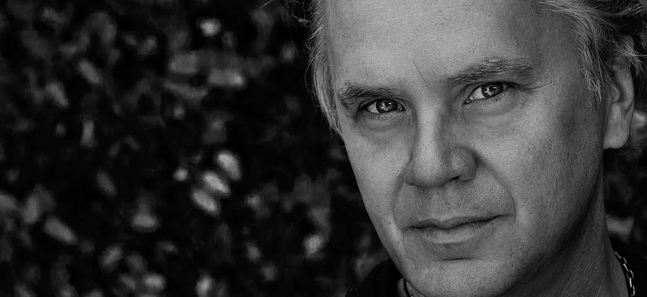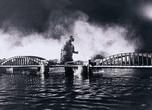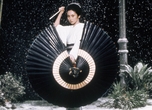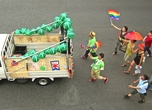
Posted: Mon Aug 15 2011
Our interview with Tim Robbins was always going to be a peculiar one. The actor-turned singer was in Japan for a week of concerts at the Blue Note Tokyo, supporting his 2010 album Tim Robbins & The Rogues Gallery Band, but we were warned beforehand not to mention any of his movies – a tough ask considering that the Oscar winner has been part of the Hollywood furniture for more than two decades – and it was politely suggested that he'd only want to talk about his music. No Susan Sarandon, then. We duly set about studying the man's only album, and the music that might have inspired it.
We needn't have been so meticulous. Tim Robbins is a walking encyclopaedia of musical minutiae (seriously, next time you find yourself in a lift with him, ask him about punk, folk, lo-fi…you get the impression he commits it all to memory like words from a script). And so we sat with him for 30 learned minutes, bouncing between family memories (his father was an admired folk singer) and his experiences of fame ('It's all in your head'), hearing about how he won't be 'going Indonesian' on his next album, and the Robbins secret to 'living free'. A wide-ranging interview, then, to say the least, and possibly his first since 1994 (we're kinda proud to say) not to use the word 'Shawkshank'…
Your father was a folk singer heavily involved in the The Gaslight [a Greenwich Village folk club that served as a breeding ground for the likes of Joni Mitchell, Dave Van Ronk and Bob Dylan]. Presumably you grew up with that kind of music around you?
Immersed in it. Immersed in music from the very start. It was what provided the first creative inspiration in my life. There was no television, we didn't go to the movies that much. Music was really where it was happening. We didn't have much money but we had a stereo, a turntable and vinyl coming into the house.
What are the earliest songs you can recall hearing?
Well, one of them I do in our set, called 'Buckeye Jim'. It's from a Burl Ives record of children's songs. Tom Paxton, Dave Van Ronk, early Weavers, Peter Paul & Mary… dad's group, The Highwaymen...
Were these people who were actually in and out the house?
Yeah. Dad had an act with Tom Paxton for a while, so he was a friend. Various people floated through. Dad hung out with a lot of them at The Kettle of Fish, next to The Gaslight. There was a whole scene there.
Were your own political views influenced by this kind of scene? I'm thinking of the kind of socialist politics that Woody Guthrie and similar folk artists espoused…
Socialist? Really? Certainly Woody Guthrie is the root of a lot of the folk revival. He and Huddie Ledbetter [Lead Belly], and The Weavers. Pete Seeger certainly had a lot to do with that. When he was blacklisted, he took his banjo on the road and went from town to town playing his songs. When he showed up in a town without his band, without The Weavers, he'd tell his audience 'I need your help', and he'd involve them in singing a lot of the songs that he'd brought along. Joan Baez said somewhere that the first time she realised she could be a folk singer was when she was at a Pete Seeger concert, singing along. Pete opened up her voice.
I always viewed folk music as something that was telling stories from generations ago, and carrying them on to a new time. It included sea shanties and work songs from the fields in the South. Certainly labour songs were part of that, as were songs about veterans from the civil war and WWI. Those traditions of storytelling were part of what folk music was about. I wouldn't say that's socialist. I'd say that's community-based music.
Is it this kind of music that you tend to listen to when you're around the house today?
Well, you know, I've gone through many phases! It was originally folk music, then of course I went through rock'n'roll, Motown, punk… But what do I listen to now? I listen to Arcade Fire, Mumford & Sons, Flaming Lips – all stuff that my kids have turned me onto. This great band called Neutral Milk Hotel…
Were there artists that you saw in concert in those formative years who you'd think, 'I wanna be just like that?'
Not really, no. I think it was more listening to the music… I never really wanted to be like anybody. I think I could say that I was influenced by a certain kind of songwriter: Tom Waits, Leonard Cohen, Springsteen… that kind of idea that they could take you into a world and within four and a half minutes your imagination was opened up.
That storytelling is key to your album…
It's key to the album and it's also key to my whole career. When I was putting together the Dead Man Walking soundtrack, the people that I reached out to were the people that had influenced me and the way I write and approach storytelling in the cinematic realm, and also in the plays I've written. The kinds of stories that I've wanted to tell from very, very early on, in the theatre and movies, were the stories that were influenced by those kind of songwriters. In fact, I'd say I was influenced more by songwriters than I was by dramatists.
The songs on your album are songs that you've been writing all your life, am I right?
One of them is old, written in 1985, called 'Dreams'. One of them was written in 1999, and the rest were written in the last five years. All of these songs were written on the road, in hotel rooms. [Laughs] They were based on experiences I'd just had with people who were in bars or on sets, people that'd come up and tell you their story. It happens when you're famous. If you're open to it, and you're not closed off, people will tell you things that they might not tell anyone else. I believe it's a kind of a blessing to be able to hear the raw story.
Continue to part 2 of our Tim Robbins interview to read about fame, flesh biting and living free...
Tweets
- About Us |
- Work for Time Out |
- Send us info |
- Advertising |
- Mobile edition |
- Terms & Conditions |
- Privacy policy |
- Contact Us
Copyright © 2014 Time Out Tokyo














Add your comment